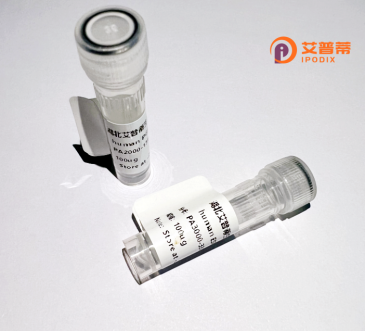
| 纯度 | >90%SDS-PAGE. |
| 种属 | Human |
| 靶点 | EI24 |
| Uniprot No | O14681 |
| 内毒素 | < 0.01EU/μg |
| 表达宿主 | E.coli |
| 表达区间 | 1-340aa |
| 氨基酸序列 | MADSVKTFLQDLARGIKDSIWGICTISKLDARIQQKREEQRRRRASSVLAQRRAQSIERKQESEPRIVSRIFQCCAWNGGVFWFSLLLFYRVFIPVLQSVTARIIGDPSLHGDVWSWLEFFLTSIFSALWVLPLFVLSKVVNAIWFQDIADLAFEVSGRKPHPFPSVSKIIADMLFNLLLQALFLIQGMFVSLFPIHLVGQLVSLLHMSLLYSLYCFEYRWFNKGIEMHQRLSNIERNWPYYFGFGLPLAFLTAMQSSYIISGCLFSILFPLFIISANEAKTPGKAYLFQLRLFSLVVFLSNRLFHKTVYLQSALSSSTSAEKFPSPHPSPAKLKATSGH |
| 分子量 | 63.14 kDa |
| 蛋白标签 | GST-tag at N-terminal |
| 缓冲液 | 0 |
| 稳定性 & 储存条件 | Lyophilized protein should be stored at ≤ -20°C, stable for one year after receipt. Reconstituted protein solution can be stored at 2-8°C for 2-7 days. Aliquots of reconstituted samples are stable at ≤ -20°C for 3 months. |
| 复溶 | Always centrifuge tubes before opening.Do not mix by vortex or pipetting. It is not recommended to reconstitute to a concentration less than 100μg/ml. Dissolve the lyophilized protein in distilled water. Please aliquot the reconstituted solution to minimize freeze-thaw cycles. |
以下是关于重组人EI24蛋白的3篇参考文献概览:
1. **文献名称**:*EI24 regulates epithelial-to-mesenchymal transition and metastasis via autophagy in breast cancer*
**作者**:Liu H, et al.
**摘要**:本研究揭示了重组人EI24蛋白通过调控自噬过程抑制乳腺癌细胞的上皮-间质转化(EMT)及转移能力,实验表明EI24表达缺失会促进肿瘤侵袭性。
2. **文献名称**:*Proteolytic processing of EI24 protein by caspase-3 during apoptosis*
**作者**:Lee H, et al.
**摘要**:文章阐明重组EI24在细胞凋亡中被caspase-3特异性切割的机制,证明其水解产物通过释放促凋亡结构域增强线粒体凋亡信号通路。
3. **文献名称**:*EI24 interacts with the p53 tumor suppressor to control DNA damage-induced cell death*
**作者**:Zhang Y, et al.
**摘要**:研究通过重组EI24蛋白体外实验,证实其与p53蛋白直接结合,协同调控DNA损伤后细胞凋亡反应,为EI24在肿瘤治疗中的潜在靶点提供依据。
---
以上文献覆盖EI24在凋亡、自噬及肿瘤转移中的功能机制,均涉及重组蛋白技术的应用。如需全文建议通过PubMed/Web of Science按标题检索。
EI24 (Etoposide-Inducible protein 24 kDa) is a nuclear- and endoplasmic reticulum (ER)-localized protein initially identified for its transcriptional upregulation during etoposide-induced apoptosis. It plays a dual role in cellular homeostasis, acting as a tumor suppressor by regulating apoptosis, autophagy, and DNA damage response. EI24 interacts with key signaling molecules, including Bcl-2 family proteins and Beclin-1. modulating mitochondrial apoptosis and autophagosome formation. Studies link EI24 deficiency to increased tumorigenesis, as observed in EI24-knockout mice exhibiting spontaneous malignancies. Its expression is epigenetically silenced in various cancers, suggesting clinical relevance.
Recombinant human EI24 protein is typically produced using prokaryotic (e.g., *E. coli*) or eukaryotic expression systems, enabling *in vitro* studies of its structural and functional properties. The recombinant form retains critical domains, including an N-terminal proline-rich region and C-terminal transmembrane domain essential for ER localization and protein interactions. Applications span biochemical assays (e.g., protein binding, enzymatic activity), cancer pathway analysis, and therapeutic screening. Ongoing research focuses on elucidating EI24's molecular mechanisms in tumor suppression and its potential as a biomarker or therapeutic target in oncology.
×